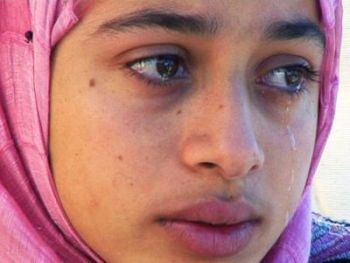
Publisher:
Bonnie King
CONTACT:
Newsroom@Salem-news.com
Advertising:
Adsales@Salem-news.com

~Truth~
~Justice~
~Peace~
TJP
Sep-23-2011 00:29


 TweetFollow @OregonNews
TweetFollow @OregonNews
'Tears of Gaza' - The Movie
Salem-News.comVibeke Lokkeberg gives us the names, faces, and stories of three ordinary Gaza children with extraordinary spirits.
 Special thanks to Gilad Atzmon |
(LONDON) - ‘Tears of Gaza’ by Vibeke Lokkeberg is a documentary film that should be watched by every American, to see how Israel spends our taxes. Every European should watch it, to see the true face of Israel. It should be viewed by every Arab, to renew our resolve not to allow a racist nation to wipe Palestine and her children from the map and from history.
I had read the stories from Gaza after Israel’s so called “operation cast lead”. I had read the reports. I thought I had cried enough then not to cry again. But this film went to my heart, stirred everything up, made the tears fall and fall and here I am now, with a hollow, spooned out hole in my gut because bombs were dropped on sleeping children, helicopters rained the death and disfigurement of white phosphorous on terrified civilians huddling at a UN school for shelter… and no one is doing anything about it.Tears of Gaza lays bare the lies, the cover ups and Richard Goldstone’s moral flip flopping. It takes you into the heart of Gaza’s tormented landscape to show the truth behind craven and mendacious headlines with words that describe Israel’s slaughter as an “incursion” or “self defense”. This film shows us these truths through the luminous spirits of children. It is not to be missed!
I first heard of “Tears of Gaza”, or “Gaza Traer” as the original Norwegian title is called, when Bernard Henri-Levi launched an attack against Lokkeberg and me in major newspapers throughout Europe. She and I were in touch after that and I was finally just able to get hold of the film to watch it. It is a monumentally important work. It is beautiful and painful and honest and devastating.
Vibeke Lokkeberg gives us the names, faces, and stories of three ordinary Gaza children with extraordinary spirits. We first fall in love with Yehya, a 12-year-old boy who wants to become a doctor so he can heal people who are shot by Israelis. We see him on a small motorboat, lost in the magic of childhood as he is taught to steer the boat. His beautiful eyes and brilliant smile during these moments make his tears all the harder to bear when he talks about his beloved father. The losses that follow in his life are incomprehensible and overwhelming merely to hear about.
Until you meet Amira, 14 years old, and walk through her world.
Amira is beautiful. It’s the kind of beauty that holds an ineffable pain not often seen in the young. Her life, too, is marred by death and destruction and disfigurement of her body by ammunition. She tells us that she wants to become a lawyer so she can take the Israelis to court for the crimes they’ve committed. Then, recalling her father and brothers, she admits wishing she had just “gone with them”.
Like Amira, Rasmia is far beyond her 11 years. Arabic speakers might detect things about her that non-Arabic speakers will not. This is largely because of the translation; and this is my only criticism of the film. When Rasmia goes into what seems like a waking trance, her mother tells us in Arabic that she is “imagining”. The translation says “memorizing”, which doesn’t make sense and it distracts from an important subtlety. Her mother explains that she sometimes just “imagines” things from the attacks. I suspect that most psychologists witnessing those scenes and hearing her mother’s explanation would agree that she was experiencing flashbacks and exhibiting clear signs of post-traumatic stress disorder.
Another example where the wrong translation obscures important nuances is when Yehya is telling us about losing his father. He is, in fact, speaking in the third person: “when someone loses their father, it’s like they’ve lost the whole world” etc. But his words are translated as if in the first person: “when my father died, it’s like I lost the whole world.” The distinction might not seem important, until you realize that he cannot get the words out without breaking down when he speaks in the first person. It’s a faint distinction, but one that makes your heart break even more.
And we should all allow our hearts be broken over Gaza. It’s the least we can do. To hear these three children and ask others to hear them is the very least we can do. Vibeke Lokkeberg has given us a monumentally important record of what happened in December 2009 to January 2010; so no one can ever say “I didn’t know”.
Lest we forget, lest our tears dry or outrage subside, and lest our hearts heal before Palestine is free, I hope this film will be shown throughout the world, across university campuses, communities, organizations and living rooms. Take this not just as a review, but a call to action.
- Susan Abulhawa is the author of Mornings in Jenin (Bloomsbury 2010) and the founder of Playgrounds for Palestine.
Special thanks To Gilad Atzmon
 |
 |
 |
 End Israel's Unwarranted Murder of Kids |
Articles for September 22, 2011 | Articles for September 23, 2011 | Articles for September 24, 2011

googlec507860f6901db00.html



Salem-News.com:
Terms of Service | Privacy Policy
All comments and messages are approved by people and self promotional links or unacceptable comments are denied.
[Return to Top]
©2026 Salem-News.com. All opinions expressed in this article are those of the author and do not necessarily reflect those of Salem-News.com.